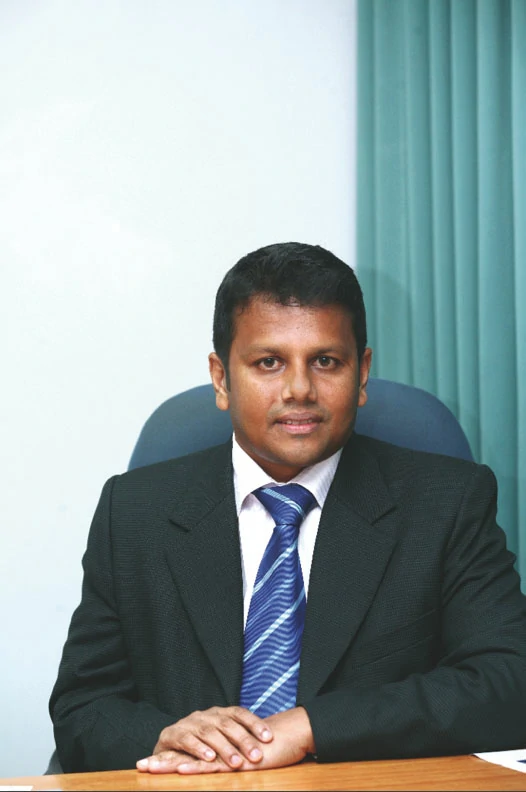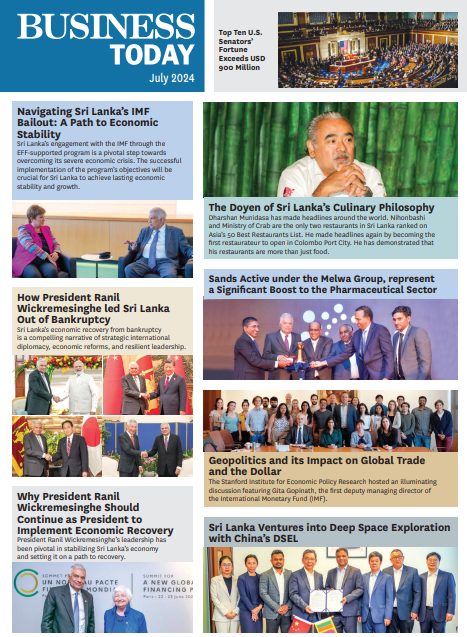
His experience is diverse and his performance has been consistent through the many roles that he has held throughout his career. Aruna Lekamge is an achiever, a person who is motivated by challenges and strives to give the best to his country. Recently appointed by President Mahinda Rajapaksa to the Board of Directors of the Sri Lanka Insurance Corporation, Aruna Lekamge spoke to Business Today of his journey, which started as a Mathematics teacher at Ananda College to become the Managing Director of a group of companies and his current position as the Senior National Coordinator of the Sri Lanka Red Cross.
By Udeshi Amarasinghe
Photography by Menaka Aravinda
When we interviewed you in 2001, you were the Business Promotion Officer at Sri Lanka Insurance Corporation. Throughout your career you have been very successful, can you tell us what has made you who you are?
I completed my primary and secondary education at Nalanda College, Colombo. I sat for my A Levels in the Mathematics stream. My parents were Government Servants. My mother was a teacher while my father was an Administrative Officer. I am the youngest in my family and my two elder sisters are also teachers. Therefore considering my family background I too started my career as a teacher. I obtained my Diploma from the National Institute of Education and my first appointment was as a Maths teacher and teacher trainer at Ananda College, Colombo.
Thereafter I joined Sri Lanka Insurance Corporation as the Business Promotion Officer. I performed extremely well and was heading a team of over thirty agents. I was the youngest Millionaire’s Club member – a special incentive scheme that Sri Lanka Insurance had developed to encourage sales people and reward them for ensuring and maintaining market leadership. Upon leaving the Sri Lanka Insurance Corporation I focussed my attention on furthering my education. I completed my Executive Diploma in Business Administration at the Colombo University. Then I proceeded to the Manchester Metropolitan University in the UK to do my postgraduate studies.
Additionally I focussed my attention on APL Group of companies of which I am the Managing Director. The Group provides transport and logistics solutions. I’m the Chairman of the Victoria International School. Since I had experience in teaching and from the exposure I got when I was in the UK, I felt that I needed to utilise and transfer my knowledge for the betterment of the Sri Lankan students.
Following the Tsunami, you joined Sri Lanka Red Cross as the Senior National Coordinator. Can you elaborate on the role you played?
Following the tsunami that devastated the Sri Lankan coastal belt in 2004, there was a huge task to be performed in the country. I offered my services to the Sri Lanka Red Cross Society to contribute for the Tsunami Recovery Process. I served as the Senior National Coordinator for relief operations and set up the Technical Support Services Unit to address the task of rebuilding the districts affected by the Tsunami. I still function as the Head of that Division. Red Cross has the mandate to provide humanitarian assistance. It is not a NGO, it is similar to the UN with a membership of more than hundred and eighty countries. I was coordinating the entire operation of rebuilding and it was a massive task. During this time I coordinated the visit of the US Secretary of State, Colin Powell to Sri Lanka. In this project we had to relocate people and provide housing, hospitals, schools and services such as safe water and sanitation. We signed MOUs with the Government, Ministry of Health, the Ministry of Housing and the Water Board.
As the architect of the tsunami recovery at the Sri Lanka Red Cross I selected a capable team of professionals with a sound background comprising of engineers, architects and technical officers as I wanted to prove to the rest of the world that we have the intellectual capital and the professional capability to integrate with foreign professionals who arrived to support the recovery effort. I believe that we have the knowledge and the skills within. Our hard work and dedication can be seen from the quality of the construction. Our programme covered the districts of Ampara, Trincomalee, Batticaloa, Colombo, Galle, Matara, Kalutara, Hambantota, Gampaha, Badulla, Puttalam, Jaffna, Polonnaruwa, Vavuniya and Mullaitivu. We looked at each district as a whole and concentrated on houses and livelihoods appropriate to each district. Additionally we constructed quality infrastructure facilities such as roads, and water supply and electrification schemes. We did not neglect social infrastructure such as pre-schools, community centres, hospitals, health care centres, markets and playgrounds. It was a formidable exercise. Other than reconstruction, we had to be extremely sensitive to humanitarian issues of relocating people residing in camps who had become landless homeless people due to the tsunami.
While fulfilling the beneficiary requirements we also had to fulfil the requirements of the donors; requiring us to achieve a high standard in multi faceted accountability. When we talk about multi faceted accountability it means taking into account the requirements of the donor, Government, line ministries and most importantly the beneficiary needs. For example we had to build hospitals conforming to national and international standards to function efficiently after we hand them over to the Health Ministry. In this respect Sri Lanka Red Cross had to assess needs of the health sector to formulate procurement functions and provide medical equipment to ensure optimum functionality in terms of equipment and staff. We built about eighty hospitals.
As The War Is Over It Is Time To Rebuild Our Country. It Is Our Responsibility To Support And Develop The Country. The Entire Nation Needs To Get Together, For The Common Task.
I have to say that I’m very proud of our programme because we ensured quality with the assistance of foreign personnel to strengthen the local construction industry. By employing local professionals we are able to create a boom in our construction industry. Even when deciding on pay scales we adhered to national norms, therefore when hiring an engineer, we matched Government rates in order to sustain the Government structure.
Our overall achievements include 30,000 houses which cover different parametres such as construction for relocation, releasing top up grants for completion and government grants. I appreciate the valuable guidance extended by Sri Lanka Red Cross President Jagath Abeysinghe for the faith he had in me to deliver the results. He’s the one who appointed me to this task. Therefore as you can see this was a remarkable coordinative effort and a land mark for the Red Cross movement world over. Our success was due to the excellent coordination between the Red Cross and the Government of Sri Lanka. Therefore I thank His Excellency the President and all Ministers and Public Officials .
There is a difference in how locals and Westerners perceive these situations, how did you meet this challenge?
It is important to understand the need to bridge the gap between Western requirements and the local needs in this situation. Due to my experience abroad I am able to understand how they think and how they work. Generally from the management point of view in European culture you have the specific approaches. They have specific needs and objectives and they set goals to achieve them. However in our culture it is more of an emergency approach. It is like a chess game. That is, only when we meet problems or bottlenecks we change our approaches. I work with so many nationalities and my responsibility is to do the work without harming my culture, our national needs and our economy.
There would have been many challenges, how did you overcome these?
Actually there were so many challenges and we can categorise them as fulfilling international donor requirements, transparency and accountability. The other main concern was how to support our economy so that there would be no disturbances in the future. The Technical Support Services Unit which I set up was able to respond to these challenges effectively. I had harnessed the necessary competencies to do the task and I have to thank the Government for giving us the fullest cooperation for this exercise.
The President has selected you as one of the Directors of the Sri Lanka Insurance Corporation; can you elaborate on the role you will play as the Director?
Yes, I love the Sri Lanka Insurance Corporation because I started my career there. As the war is over it is time to rebuild our country. It is our responsibility to support and develop the country. The entire nation needs to get together, for the common task. Therefore I’m very proud to be appointed to this position to serve the needs of the future. On the other hand since I have a good understanding and experience in the insurance sector I know the requirements. The company needs the infusion of management skills and insurance expertise. We have to bring in the technology to increase capacity and efficiency of operations to become the market leader. I believe that the Board of Directors, His Excellency the President has appointed will bring in the Enterprise Dimension required to address these issues more efficiently and serve the interests of the policy holders. We have a very important task to perform.
How would you utilise your numerous experiences in this current role?
My background is in management accounting, corporate management, organisation dynamics, risk management and insurance. Therefore I will be able to give my support to develop the Insurance Corporation in those spheres. My dream is to make the Sri Lanka Insurance Corporation number one in the country.
What motivates you to keep you going?
Challenges and obstacles motivate me, I always strive to overcome these, which has resulted in a high level of performance. My past is a testimony to that. I’m taking this opportunity that has been given to me in a very responsible manner in order to serve the national interest.






